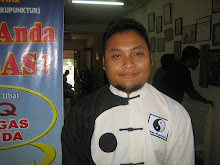Acupuncture Study Brings Hope For Parkinson's
Disease Patients
By Brenda Duran, Senior Associate Editor
For
people living with Parkinson's disease, the future is full of obstacles and
uncertainty.
This
is the sole reason the second most prevalent neuro-degenerative disease that
affects about 1 million people in the U.S., and 5 million worldwide has
researchers constantly on the hunt for not only a cure, but also a way to
improve the quality of life for patients.
By
the year 2013, a current research study involving acupuncture is hoping to find
answers for Parkinson's disease patients living with one of the most
debilitating side effects – fatigue.
The research study funded by the Michael J. Fox Foundation for Parkinson's
Research is currently determining whether alternative Eastern medicine,
specifically acupuncture, can help alleviate symptoms of severe fatigue in
those living with Parkinson's.
The
foundation, which was established in 2000 by actor Michael J. Fox, is the
largest funder of Parkinson's research in the world. The organization has
funded over $270 million in targeted Parkinson's research to date including the
latest study on acupuncture.
Dr.
Benzi Kluger, assistant professor of neurology and psychiatry at the University
of Colorado Hospital has been leading the study, which began in November 2010.
The study is being conducted as a double-blind study to find whether
acupuncture has a significant effect on Parkinson's patients living with
fatigue in their daily lives.
"Western
medicine does not have good treatment for fatigue," said Kluger.
"Fatigue for patients with Parkinson's is really different, it doesn't
improve with rest and is very disabling."
Fatigue
affects approximately half of all Parkinson's disease patients. Many of them do
not get relief from medication and research has now focused on ancient Eastern medicine
such as acupuncture to find answers, said Kluger.
"We
wanted to see if we can come up with alternative strategies that can also later
help people with other neurological disorders in the future," said Kluger.
Kluger
approached the Parkinson's foundation with his study because he said he was
interested in non-motor systems in Parkinson's patients. Non-motor symptoms are
the most common symptoms that develop first in patients and one of them is
fatigue.
Jamie
Eberling, associate director of research programs at the Michael J. Fox
Foundation for Parkinson's Research said Kluger's study was chosen based on its
merits and because it was something of interest to their donor base.
"We
are always interested in different types of approaches," said Eberling.
"We are always open to new things, we wish we could see more of these
types of studies being presented."
The
foundation in the past has funded studies on exercise and even singing for
speech problems as well as dancing for motor impairment in Parkinson's disease
patients. They review 800 grant proposals a year and are currently supporting
more than 300 research projects in industry, academia and government.
Kluger's
acupuncture study has a total of 22 patients participating right now. The goal
is to have 90-100 patients by the study's end date in 2013.
Patients
who joined the study initially came in for a screening visit and filled out a
questionnaire about fatigue and their beliefs about acupuncture and alternative
medicine. Once people were screened into the study, they were randomized with
twice weekly sham or real acupuncture.
Patients
in the study are blindfolded while they are receiving acupuncture treatment and
Kluger said he doesn't know which patients are receiving acupuncture treatment
and which patients are receiving placebo.
Three
acupuncturists have been working on the study subjects placing needles in
acupuncture points on the patient's face and back. For patients who are in the
placebo group, the acupuncturists may place non-penetrating needles in spots
that aren't typical acupuncture spots.
Kluger
said in the spring, his team is going to try to shell out a paper on the sham
acupuncture after spending a lot of time learning how to remove the sham needles
to create a really good placebo procedure.
So
far, Kluger said he has seen dramatic improvement in fatigue in some of the
study subjects. "People have gone back to doing activities that they
haven't done in years," he said. Since the statistical data is not yet
completed, Kluger said he wouldn't know which group has benefitted the most.
Kluger
noted that a large majority of Parkinson's disease patients already use a form
of alternative medicine – acupuncture, massage, herbs and chiropractic care,
but until now, there weren't many evidence-based studies to determine whether
acupuncture is effective for symptoms such as fatigue.
The
neuro-degenerative disease affects between 1 percent and 2 percent of people
over the age of 65. Those diagnosed with the disease will lose neurons in
specific parts of the brain, affecting muscle movement and control over time.
Kluger
said if he finds that acupuncture can be used as an alternative form of
medicine to alleviate the symptoms of severe fatigue, it might help insurance
companies extend their coverage of the treatment.
"We
will also be able to see if acupuncture would be effective for people with
other diseases like cancer and MS (Multiple Sclerosis)," Kluger said.
Focusing
most of his medical career in Western medicine, Kluger said he has really
enjoyed doing research on Eastern medicine and finding out about the potential
it has to heal people.
"For
me it has been a wonderful opportunity to work with acupuncturists to really
start to delve into acupuncture. One of my goals is to come out of it with an
open mind," he said. "It's been really fun to explore alternative
ways to help these patients. We are hopeful."















